情态动词简单版
情态动词

情态动词情态动词包括can / could、dare、shall / should、need、must、will / would、may / might、ought to等。
一、can和could的用法情态动词can有两种形式,即现在式can和过去式could。
(一)基本用法1、表示能力。
She can drive, but she can’t ride a bike.她会开车,但她不会骑自行车。
Could you speak English then?那时候你能讲英语吗?2、表示许可。
Students can’t smoke in the classroom.学生不许在教室里吸烟。
Father said that I could swim in the river.爸爸说我可以在河里游泳。
3、表示可能性。
Our club finances can be improved further.我们俱乐部的财务情况还可以进一步得到改善。
Y ou could be right, I suppose.我想可能是你对。
4、表示推测,常用于否定句和疑问句中。
He can’t be in the classroom now.他此刻不可能在教室里。
We couldn’t have heard them because of the noise from the river.由于江水的响声,我们不可能听见他们。
(二)实际运用中应注意的问题1、表示对现在或未来情况的推测时,其结构为can’t / couldn’t + 动词原形或can’t / couldn’t + be + doing,而它的肯定结构分别为must be / may (might) be,或must be doing / may (might) be doing。
She couldn’t make mistakes on this matter.在这个问题上,她不可能犯错误。
14个情态动词及其用法

14个情态动词及其用法14个情态动词及其用法如下:1.can:表示能力,用于疑问句或否定句中表示惊异、怀疑、不相信等态度。
如:Can you speak English?你会说英语吗?2.could:表示过去的能力或可能性。
表示惊异、怀疑、不相信等态度时,可用could。
如:Could you have done this?你真的能做到这个吗?3.may:表示可能性。
用于请求、允许、祝愿等场合。
如:May I borr ow your book?我能借你的书吗?4.might:表示可能性,比may更委婉。
如:Might I have your attenti on,请大家注意。
5.must:表示肯定、确定,用于陈述事实或推测。
如:The game must be over,比赛应该结束了。
6.need:表示需要、必要性。
如:We need to finish this task today。
我们今天需要完成这个任务。
7.ought to:表示应该、应当,用于表示道义上的责任或推测。
如:Yo u ought to help him,你应当帮助他。
8.dare:表示勇气、敢。
如:Dare you jump off the bridge?你敢从桥上跳下去吗?9.shall:表示询问、承诺、威胁等。
如:Shall we start?我们开始吗?10.will:表示将来、意愿、决心等。
如:I will finish this work on ti me.我会按时完成这个工作。
11.had better:表示建议、警告。
如:You had better hurry,你最好快点。
12.have to:表示被迫、必须。
如:I have to go to work,我必须去上班。
ed to:表示过去经常发生的动作或状态,也可表示习惯或倾向。
如:He used to smoke,他过去经常抽烟。
14.shouldn't:表示不应该,用于否定句中表示建议、批评等。
常见的情态动词有简版范文
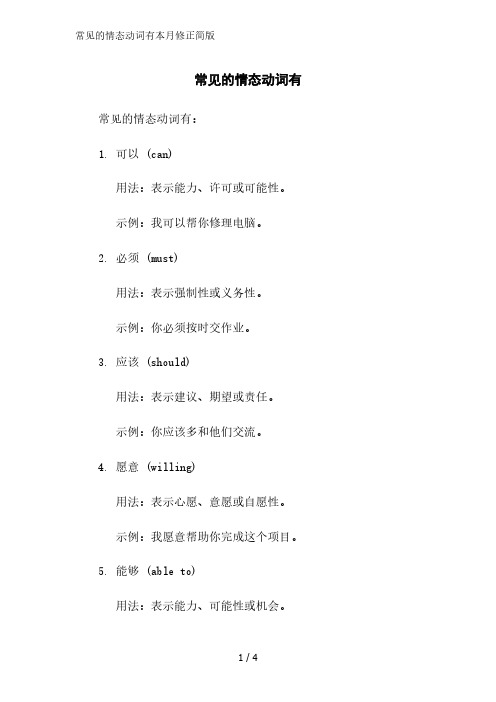
常见的情态动词有常见的情态动词有:1. 可以 (can)用法:表示能力、许可或可能性。
示例:我可以帮你修理电脑。
2. 必须 (must)用法:表示强制性或义务性。
示例:你必须按时交作业。
3. 应该 (should)用法:表示建议、期望或责任。
示例:你应该多和他们交流。
4. 愿意 (willing)用法:表示心愿、意愿或自愿性。
示例:我愿意帮助你完成这个项目。
5. 能够 (able to)用法:表示能力、可能性或机会。
示例:我能够独立完成这项任务。
6. 在过去,可以 (could)用法:表示过去的能力、许可或可能性。
示例:他过去可以说流利的法语。
7. 在过去,必须 (had to)用法:表示过去的强制性或义务性。
示例:我昨天晚上不得不加班。
8. 在过去,应该 (should have)用法:表示过去的建议、期望或责任。
示例:你昨天晚上应该去参加聚会。
9. 在过去,愿意 (was willing)用法:表示过去的心愿、意愿或自愿性。
示例:我昨天晚上愿意帮助你的。
10. 在过去,能够 (was able to)用法:表示过去的能力、可能性或机会。
示例:我昨天晚上能够准时到达会议室。
11. 可能 (may)用法:表示可能性、许可或请求。
示例:我可能会迟到一些,请等一下。
12. 可能 (might)用法:表示过去的可能性、许可或请求。
示例:我可能会迟到一些,请等一下。
13. 不可以 (cannot)用法:表示禁止、不可能或不许可。
示例:你不能在这里抽烟。
14. 不必须 (not have to)用法:表示不必要或没有义务。
示例:你不必非要等到明天。
15. 不应该 (should not)用法:表示不应该或不建议。
示例:你不应该对他说那样的话。
16. 不愿意 (unwilling)用法:表示不愿意或不希望。
示例:他不愿意参加这个聚会。
17. 不能够 (unable to)用法:表示无法、不可能或没有机会。
示例:他无法赴约因为其他事务。
情态动词及例句
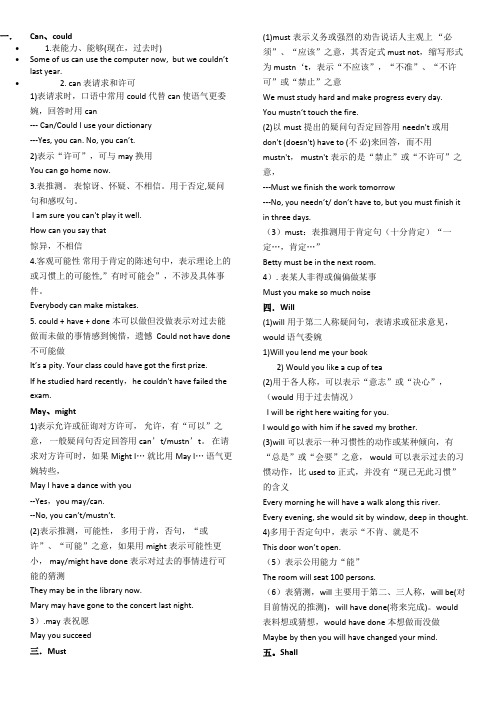
一.Can、could• 1.表能力、能够(现在,过去时)•Some of us can use the computer now, but we couldn’t last year.• 2. can 表请求和许可1)表请求时,口语中常用could 代替 can 使语气更委婉,回答时用can--- Can/Could I use your dictionary---Yes, you can. No, you can’t.2)表示“许可”,可与may 换用You can go home now.3.表推测。
表惊讶、怀疑、不相信。
用于否定,疑问句和感叹句。
I am sure you can't play it well.How can you say that惊异,不相信4.客观可能性常用于肯定的陈述句中,表示理论上的或习惯上的可能性,”有时可能会”,不涉及具体事件。
Everybody can make mistakes.5. could + have + done 本可以做但没做表示对过去能做而未做的事情感到惋惜,遗憾 Could not have done 不可能做It’s a pity. Your class could have got the first prize.If he studied hard recently,he couldn't have failed the exam.May、might1)表示允许或征询对方许可,允许,有“可以”之意,一般疑问句否定回答用can’t/mustn’t。
在请求对方许可时,如果Might I…就比用May I…语气更婉转些,May I have a dance with you--Yes,you may/can.--No, you can’t/mustn’t.(2)表示推测,可能性,多用于肯,否句,“或许”、“可能”之意,如果用might表示可能性更小, may/might have done 表示对过去的事情进行可能的猜测They may be in the library now.Mary may have gone to the concert last night.3).may表祝愿May you succeed三.Must (1)must表示义务或强烈的劝告说话人主观上“必须”、“应该”之意,其否定式 must not,缩写形式为 mustn‘t,表示“不应该”,“不准”、“不许可”或“禁止”之意We must study hard and make progress every day.You mustn‘t touch the fire.(2)以must提出的疑问句否定回答用needn't或用don't (doesn't) have to (不必)来回答,而不用mustn't, mustn't表示的是“禁止”或“不许可”之意,---Must we finish the work tomorrow---No, you needn’t/ don’t have to, but you must finish it in three days.(3)must:表推测用于肯定句(十分肯定)“一定…,肯定…”Betty must be in the next room.4). 表某人非得或偏偏做某事Must you make so much noise四.Will(1)will用于第二人称疑问句,表请求或征求意见,would 语气委婉1)Will you lend me your book2) Would you like a cup of tea(2)用于各人称,可以表示“意志”或“决心”,(would用于过去情况)I will be right here waiting for you.I would go with him if he saved my brother.(3)will可以表示一种习惯性的动作或某种倾向,有“总是”或“会要”之意, would可以表示过去的习惯动作,比used to正式,并没有“现已无此习惯”的含义Every morning he will have a walk along this river. Every evening, she would sit by window, deep in thought.4)多用于否定句中,表示“不肯、就是不This door won’t open.(5)表示公用能力“能”The room will seat 100 persons.(6)表猜测,will主要用于第二、三人称,will be(对目前情况的推测),will have done(将来完成)。
常见的情态动词有
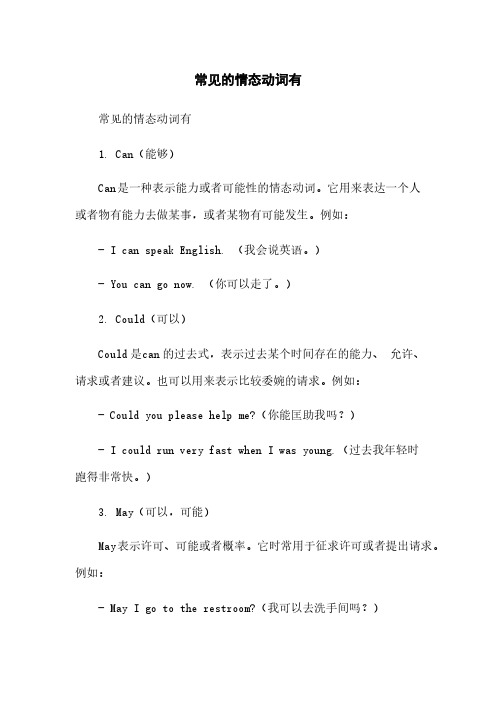
常见的情态动词有常见的情态动词有1. Can(能够)Can是一种表示能力或者可能性的情态动词。
它用来表达一个人或者物有能力去做某事,或者某物有可能发生。
例如:- I can speak English. (我会说英语。
)- You can go now. (你可以走了。
)2. Could(可以)Could是can的过去式,表示过去某个时间存在的能力、允许、请求或者建议。
也可以用来表示比较委婉的请求。
例如:- Could you please help me?(你能匡助我吗?)- I could run very fast when I was young.(过去我年轻时跑得非常快。
)3. May(可以,可能)May表示许可、可能或者概率。
它时常用于征求许可或者提出请求。
例如:- May I go to the restroom?(我可以去洗手间吗?)- It may rn tomorrow.(明天可能会下雨。
)4. Might(可能)Might是may的过去式,有可能或者有时表示不太可能的事情。
例如:- I might go to the party tonight.(我可能会今晚去参加派对。
)- She sd she might come to visit us next week.(她说她可能下周会来看我们。
)5. Must(必须)Must是一种表示必要性或者肯定性的情态动词。
它表示某事是有必要或者肯定的。
例如:- You must finish your homework before you go out to play.(你必须在外出玩之前完成作业。
)- He must be tired after such a long journey.(经过这么长的旅行,他一定很累。
)6. Shall(将要)Shall是一种较为正式或者古老的情态动词,常用于提出建议、征求意见或者表示将来意图。
例如:- Shall we go for a walk?(我们出去散散步好吗?)- I shall do my best to finish the project on time.(我将竭力按时完成这个项目。
(完整版)七年级情态动词
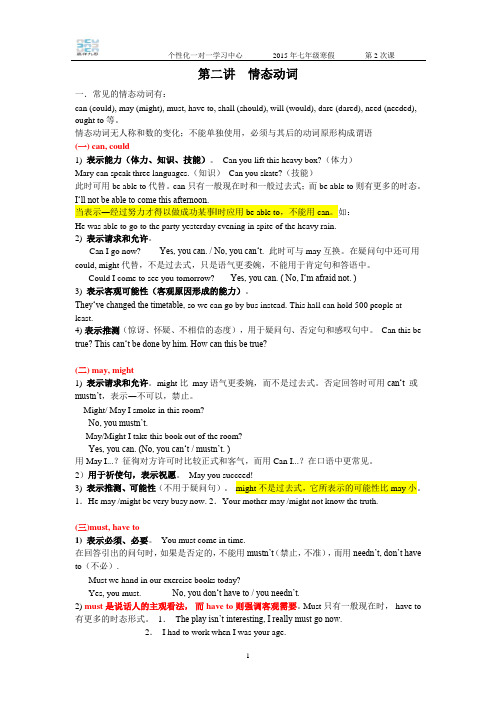
第二讲情态动词一.常见的情态动词有:can (could), may (might), must, have to, shall (should), will (would), dare (dared), need (needed), ought to等。
情态动词无人称和数的变化;不能单独使用,必须与其后的动词原形构成谓语(一) can, could1) 表示能力(体力、知识、技能)。
Can you lift this heavy box?(体力)Mary can speak three languages.(知识)Can you skate?(技能)此时可用be able to代替。
can只有一般现在时和一般过去式;而be able to则有更多的时态。
I‘ll not be able to come this afternoon.当表示―经过努力才得以做成功某事‖时应用be able to,不能用can。
如:He was able to go to the party yesterday evening in spite of the heavy rain.2) 表示请求和允许。
-----Can I go now? ----- Yes, you can. / No, you can‘t. 此时可与may互换。
在疑问句中还可用could, might代替,不是过去式,只是语气更委婉,不能用于肯定句和答语中。
---- Could I come to see you tomorrow? ---- Yes, you can. ( No, I‘m afraid not. )3) 表示客观可能性(客观原因形成的能力)。
They‘ve changed the timetable, so we can go by bus instead. This hall can hold 500 people at least.4)表示推测(惊讶、怀疑、不相信的态度),用于疑问句、否定句和感叹句中。
常见的情态动词有

常见的情态动词有常见的情态动词有情态动词是指用来表示说话者观点、态度、推测、意愿、许可和能力等语气的一类动词。
在英语中,常见的情态动词有以下几个:1. Can(能够): Can表示能够做某事,表示某种能力或许可。
例如:I can speak English fluently.(我能够流利地说英语。
)Can I use your phone?(我能用你的方式吗?)2. Could(可以): Could是can的过去式,表示过去某个时间点或过去的能力。
例如:When I was younger, I could run faster.(我年轻的时候跑得更快。
)Could you please pass me the salt?(你能给我传一下盐吗?)3. May(可能): May表示推测或说话者对某种情况的不确定性。
例如:It may rn later, so you should bring an umbrella.(可能会下雨,所以你应该带把伞。
)May I ask you a question?(我可以问你一个问题吗?)4. Might(可能): Might是may的过去式,表示在过去某个时间点的不确定性。
例如:I thought I might go to the party, but I changed my mind.(我本来可能会去参加派对,但是我改变了主意。
)He might be late for the meeting.(他可能会迟到会议。
)5. Must(必须): Must表示强烈的必要性,或者根据逻辑推理所得出的。
例如:You must finish your homework before going out to play.(你必须在出去玩之前完成作业。
)The door is locked, so he must have left already.(门是锁着的,所以他肯定已经离开了。
常见的情态动词有

常见的情态动词有情态动词是英语中的一类特殊的动词,用于表示说话人对某种动作、状态或者可能性的态度、推测、能力、请求等。
常见的情态动词包括can、could、may、might、shall、should、will、would、must等。
下面将对这些常见的情态动词进行详细介绍。
1. cancan是一个常见的情态动词,用于表示能力、许可、请求等。
在表示能力时,can常与动词原形连用,如“I can swim.”(我会游泳)。
在表示许可时,can常与动词原形连用,如“You can go now.”(你现在可以走了)。
在表示请求时,can常与主语连用,如“Can you help me?”(你能帮我吗)。
2. couldcould是can的过去式,常用于表示过去的能力、许可、请求等。
在表示过去的能力时,could常与动词原形连用,如“When I was young, I could run very fast.”(当我年轻的时候,我跑得很快)。
在表示过去的许可时,could常与动词原形连用,如“He said we could use his car.”(他说我们可以用他的车)。
在表示过去的请求时,could常与主语连用,如“Could you lend me some money?”(你能借我一些钱吗)。
3. maymay是一个常见的情态动词,用于表示可能性、许可等。
在表示可能性时,may常与动词原形连用,如“It may rain tomorrow.”(明天可能会下雨)。
在表示许可时,may常与动词原形连用,如“May I use your phone?”(我可以用一下你的手机吗)。
4. mightmight是may的过去式,常用于表示过去的可能性、许可等。
在表示过去的可能性时,might常与动词原形连用,如“She thought shemight be late.”(她觉得她可能会迟到)。
在表示过去的许可时,might常与动词原形连用,如“Might I ask you a question?”(我可以问你个问题吗)。
情态动词的用法总结表格

情态动词的用法总结表格|情态动词|用法|例句||||||can|表示能力,“能,会”|I can swim 我会游泳。
|||表示许可,“可以”|You can go now 你现在可以走了。
|||表示可能性,“可能”|It can be very cold in winter 冬天可能会很冷。
||could|can 的过去式,表示过去的能力|I could ride a bike when I was five 我五岁时就能骑自行车。
|||could 可用于委婉地提出请求、建议等|Could you please help me? 您能帮我一下吗?||may|表示许可或请求许可,“可以”|May I come in? 我可以进来吗?|||表示可能性,“也许,可能”|It may rain tomorrow 明天可能下雨。
||might|may 的过去式|He said that he might come 他说他可能来。
|||用于可能性较小的推测|She might be at home 她也许在家。
||must|表示必须,强调主观上的“必须”|You must finish your homework 你必须完成作业。
|||表示肯定的推测,“一定”|He must be very tired 他一定很累了。
||have to|表示客观上的“不得不”|I have to go now 我现在得走了。
|||有人称、数和时态的变化|She has to do a lot of housework 她不得不做很多家务。
||should|表示应该,常用来提出建议|You should study hard 你应该努力学习。
|||表示推测,“应该”|They should be there by now 他们现在应该到那儿了。
||ought to|同 should ,表示应该|You ought to listen to your parents 你应该听你父母的话。
学习使用简单的情态动词

学习使用简单的情态动词情态动词是英语中的一类特殊动词,用于表示说话人对某种行为或状态的态度、意愿、能力、可能性等。
掌握使用情态动词可以丰富语言表达,使语句更加准确和流畅。
以下是一些常见的简单情态动词及其用法。
1. Can(能够,可以)Can用于表示能力、许可和请求:- 表示能力:I can swim.(我会游泳。
)- 表示许可:Can I go to the restroom?(我可以去洗手间吗?)- 表示请求:Can you help me with this?(你能帮我一下吗?)2. Could(可以,能够)Could是can的过去式,常用于表示过去的能力、许可和请求,也用于表示礼貌或委婉的请求:- 表示过去的能力:When I was young, I could run very fast.(我小的时候,我跑得很快。
)- 表示许可:Could I borrow your pen, please?(请问我可以借用你的笔吗?)- 表示请求:Could you please pass me the salt?(请你把盐递给我好吗?)- 表示委婉的请求:Could you turn down the volume a little?(能不能把音量调低一点?)3. May(可能,可以)May用于表示可能性、许可和请求:- 表示可能性:It may rain later.(可能下雨。
)- 表示许可:May I have a piece of cake?(我可以吃一块蛋糕吗?)- 表示请求:May I use your phone?(我可以用一下你的手机吗?)4. Might(可能,也许)Might是may的过去式,表示过去的可能性、委婉的请求或建议:- 表示过去的可能性:He said he might come to the party.(他说他可能会来参加派对。
)- 表示委婉的请求:Might I suggest a different approach?(我可以建议一个不同的方法吗?)5. Must(必须,一定)Must用于表示必要性、推测和不得不:- 表示必要性:You must submit your assignment by Friday.(你必须在星期五之前提交作业。
英语情态动词
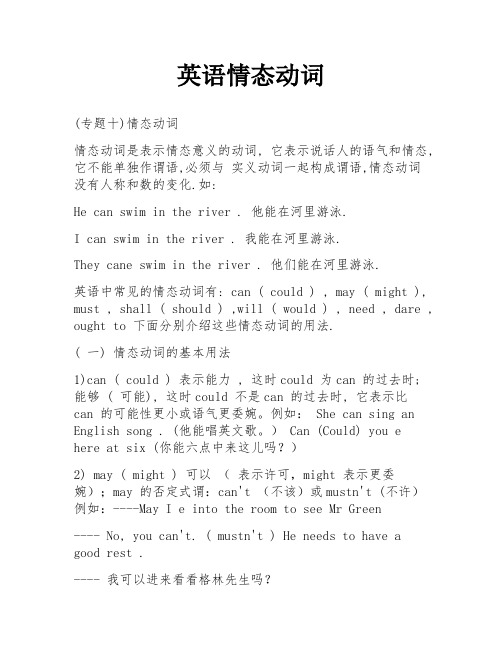
英语情态动词(专题十)情态动词情态动词是表示情态意义的动词, 它表示说话人的语气和情态,它不能单独作谓语,必须与实义动词一起构成谓语,情态动词没有人称和数的变化.如:He can swim in the river . 他能在河里游泳.I can swim in the river . 我能在河里游泳.They cane swim in the river . 他们能在河里游泳.英语中常见的情态动词有: can ( could ) , may ( might ), must , shall ( should ) ,will ( would ) , need , dare , ought to 下面分别介绍这些情态动词的用法.( 一) 情态动词的基本用法1)can ( could ) 表示能力 , 这时could 为can 的过去时; 能够 ( 可能), 这时could 不是can 的过去时, 它表示比can 的可能性更小或语气更委婉。
例如: She can sing an English song . (他能唱英文歌。
) Can (Could) you ehere at six (你能六点中来这儿吗?)2) may ( might ) 可以(表示许可,might 表示更委婉);may 的否定式谓:can't (不该)或mustn't (不许)例如:----May I e into the room to see Mr Green---- No, you can't. ( mustn't ) He needs to have a good rest .---- 我可以进来看看格林先生吗?----- 不,你不要进来。
它需要很好地休息。
3)must 必须 ;否定式 mustn't ,意思为:一定不要;回答must 提问时,否定用needn't , 如:----- Must I start at once 我必须立即开始吗?----- No , you needn't . 不,不必。
常见的情态动词有
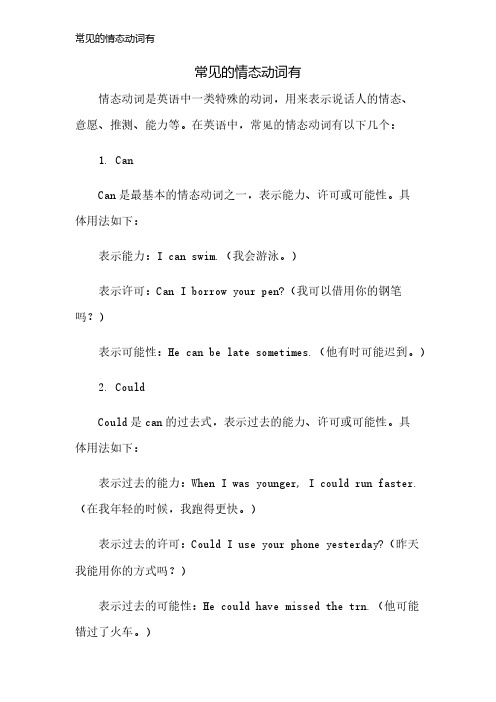
常见的情态动词有情态动词是英语中一类特殊的动词,用来表示说话人的情态、意愿、推测、能力等。
在英语中,常见的情态动词有以下几个:1. CanCan是最基本的情态动词之一,表示能力、许可或可能性。
具体用法如下:表示能力:I can swim.(我会游泳。
)表示许可:Can I borrow your pen?(我可以借用你的钢笔吗?)表示可能性:He can be late sometimes.(他有时可能迟到。
)2. CouldCould是can的过去式,表示过去的能力、许可或可能性。
具体用法如下:表示过去的能力:When I was younger, I could run faster.(在我年轻的时候,我跑得更快。
)表示过去的许可:Could I use your phone yesterday?(昨天我能用你的方式吗?)表示过去的可能性:He could have missed the trn.(他可能错过了火车。
)3. MayMay表示可能性、许可或请求。
具体用法如下:表示可能性:It may rn tomorrow.(明天可能会下雨。
)表示许可:May I go to the bathroom?(我可以去洗手间吗?)表示请求:May I ask you a question?(我可以问你一个问题吗?)4. MightMight是may的过去式,表示过去的可能性、许可或请求。
具体用法如下:表示过去的可能性:I thought he might be at home.(我以为他可能在家。
)表示过去的许可:Might I borrow your car last week?(上周我可以借你的车吗?)表示过去的请求:Might I have a moment of your time?(我可以占用你一点时间吗?)5. MustMust表示必须、责任或推测。
具体用法如下:表示必须:You must finish your homework before going out.(你必须在出去之前完成作业。
常见的情态动词有

常见的情态动词有情态动词是英语中重要的词类之一,它们强调了说话者对某种态度、情感或推测的表达。
在英语中,一共有十种情态动词,它们分别是 can、could、may、might、shall、should、will、would、must 和 ought to。
下面将分别介绍这十种情态动词的基本用法和常见表达方式。
1. cancan 是情态动词中最常用的一种,用于表示“能力”、“许可”或“可能性”等含义。
例如:- I can speak Chinese fluently.(我说中文说得很流利。
)- Can I borrow your pen for a moment?(我能否借一下你的笔?)- It can be difficult to understand Shakespeare.(理解莎士比亚可能会很困难。
)can 的否定形式是can’t,表示“不能”或“不可能”。
例如:- I can’t run very fast.(我跑不太快。
)- This can’t be true.(这不可能是真的。
)2. couldcould 是 can 的过去式,也可以表示“能力”、“许可”或“可能性”。
它比 can 更委婉,常用于礼貌性的请求、建议或询问。
例如:- Could you please pass me the salt?(你能把盐递给我吗?)- I think we could try to finish this project by next week.(我想我们下周会试着完成这个项目。
)- It could rain later, so take an umbrella just in case.(天气可能会下雨,所以带把伞以防万一。
)could 的否定形式是couldn’t,表示“不能”或“不可能”。
例如:- I couldn’t understand what he was saying.(我听不懂他在说什么。
情态动词简单版20 道
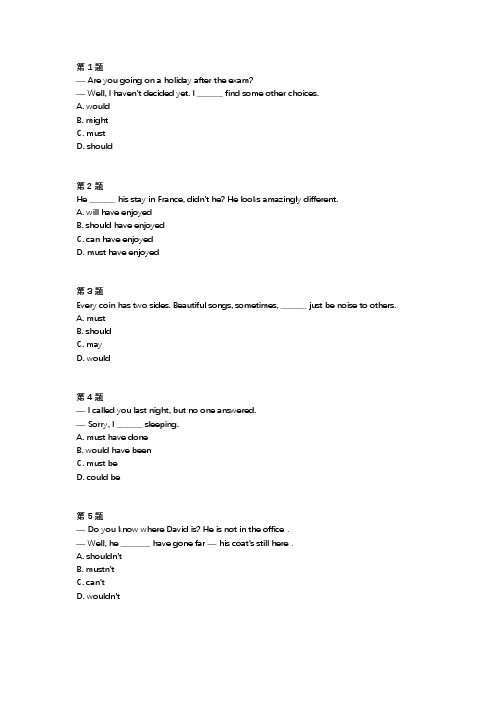
— Are you going on a holiday after the exam?— Well, I haven't decided yet. I _______ find some other choices.A. wouldB. mightC. mustD. should第2题He _______ his stay in France, didn't he? He looks amazingly different.A. will have enjoyedB. should have enjoyedC. can have enjoyedD. must have enjoyed第3题Every coin has two sides. Beautiful songs, sometimes, _______ just be noise to others.A. mustB. shouldC. mayD. would第4题— I called you last night, but no one answered.— Sorry, I _______ sleeping.A. must have doneB. would have beenC. must beD. could be第5题— Do you know where David is? He is not in the office.— Well, he ________ have gone far —his coat’s still here.A. shouldn'tB. mustn’tC. can’tD. wouldn’tThe lady _______ have done something wrong, because she is looking guilty.A. wouldB. shouldC. canD. must第7题— It's really great to have a computer to store my photos.— Don't count on it too much. It _______ break down and you'd better make a copy of them.A. mustB. canC. shouldD. will第8题— May you live longer, grandpa!— Thank you! It's the favorite wish I _______.A. should have waited forB. must have waited forC. may have waited forD. could have waited for第9题— How long shall we wait here?— The first bus set out earlier than usual today and _______ be here any time, I think.A. shouldB. mightC. canD. must第10题— Difficulties always go with me!— Cheer up! If God closes door in front of you, there _______ be a window opened for you.A. mustB. wouldC. couldD. canOne of our rules is that every student _______ wear school uniform while at school.A. mightB. couldC. shallD. will第12题It _______ be the postman at the door. It's only six o'clock.A. mustn'tB. can'tC. won'tD. needn't第13题The phone is ringing but there is no answer. She _______ be at home.A. may notB. mustn'tC. can'tD. wouldn't第14题— Excuse me, is this the right way to the bank?— It _______ be but I'm not sure.A. willB. mustC. mightD. shall第15题He _______ have watched TV at home for I saw him in the classroom.A. shouldn'tB. couldn'tC. mustn'tD. may notWhen I got to the theater, the film had already begun. I earlier.A. ought to startB. can startC. should have startedD. must have started第17题— A man is asking to meet you in the waiting room. _____ he come in?— Let him in, please.A. WillB. CouldC. ShallD. Would第18题— Is Mike coming by train?— He should, but he _____ not. He likes driving his own car.A. mustB. canC. needD. may第19题The World Wide Web is sometimes jokingly called the World Wide Wait because it _______ be very slow.A. shouldB. mustC. willD. can第20题With traffic becoming heavier and heavier, you _______ in a traffic jam anywhere in the world.A. will stuckB. can get stuckC. need get stuckD. may stuck【参考答案】第1题【答案】B【解析】本题主要考查情态动词。
完整版)情态动词总结

完整版)情态动词总结情态动词是用来表示说话人的语气和态度的,包括需要、愿意和怀疑等。
它们有一定的意义,但不完整,必须和主要动词的原形一起构成谓语。
常用的情态动词有:can、could、may、might、must、haveto、oughtto、should、will、would、need、dare、shall、be able to及半情态动词had better、would rather、have to、would like to。
下面是情态动词的基本用法:一、can1.表示能力“能……,会……”。
例如:A computer can’t think for itself。
it must be told what to do.2.表示许可,“能够……,可以……”;在疑问句中表示请求许可“能不能……,要不要……,用could表委婉语气,还可以用may”。
例如:You can go out to play when you ___.Can /Could /May I go now。
—Yes。
you can/may.Could you give me a lift to the n?3.表示猜测,通常用在疑问句中,表示惊讶、怀疑;用于否定句中,表示有把握的否定推测“不可能……”。
例如:Who can it be。
那会是谁呢?Can it be true?那会是真的吗?She can’t be waiting for you.她不可能在等你。
He can’t have gone there alone.他不可能独自一人到那儿去。
4.表示平时大部分时间不是这样,只是偶然发生。
“有时候会……”。
例如:Some ___ at home ___.Peter can be really hard to get along with even though he is a nice person in general.特别记忆:①can not/ can never…too…或___“再……也过分,越……就越好”。
学习使用简单的情态动词和情态副词
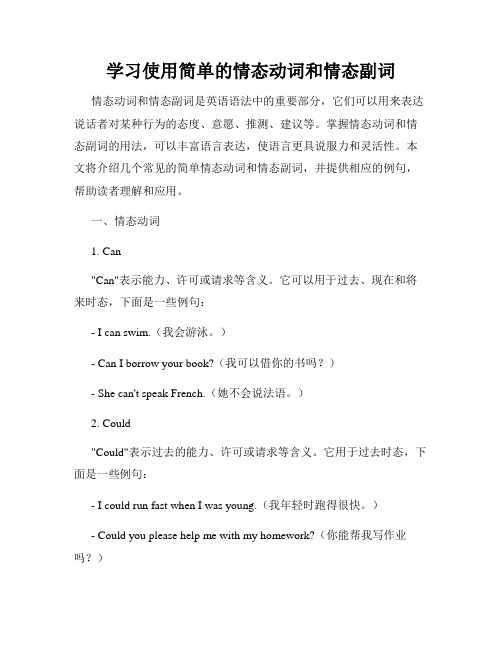
学习使用简单的情态动词和情态副词情态动词和情态副词是英语语法中的重要部分,它们可以用来表达说话者对某种行为的态度、意愿、推测、建议等。
掌握情态动词和情态副词的用法,可以丰富语言表达,使语言更具说服力和灵活性。
本文将介绍几个常见的简单情态动词和情态副词,并提供相应的例句,帮助读者理解和应用。
一、情态动词1. Can"Can"表示能力、许可或请求等含义。
它可以用于过去、现在和将来时态,下面是一些例句:- I can swim.(我会游泳。
)- Can I borrow your book?(我可以借你的书吗?)- She can't speak French.(她不会说法语。
)2. Could"Could"表示过去的能力、许可或请求等含义。
它用于过去时态,下面是一些例句:- I could run fast when I was young.(我年轻时跑得很快。
)- Could you please help me with my homework?(你能帮我写作业吗?)- He couldn't come to the party yesterday.(昨天他不能来参加派对。
)3. May"May"表示允许、请求、可能等含义。
它用于现在和将来时态,下面是一些例句:- May I take a day off tomorrow?(我可以明天请一天假吗?)- You may need a visa to travel to that country.(你去那个国家可能需要签证。
)- It may rain later, so bring an umbrella.(天可能会下雨,带把伞。
)4. Might"Might"表示可能性较小或推测等含义。
它用于现在和将来时态,下面是一些例句:- He might be late for the meeting.(他可能会迟到会议。
情态动词简单易懂
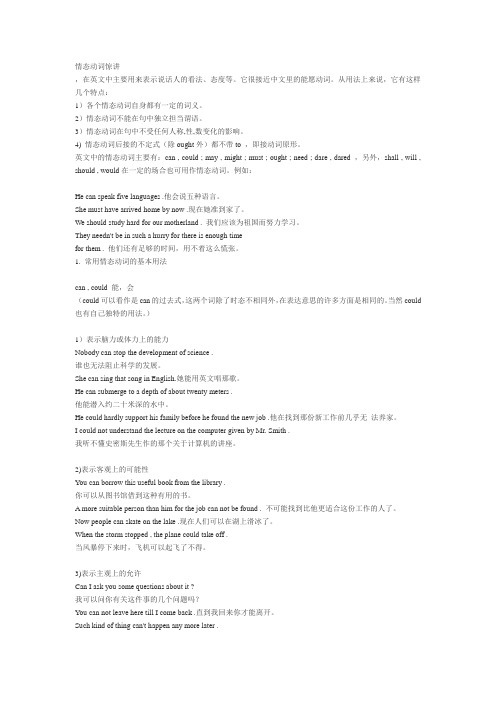
情态动词惊讲,在英文中主要用来表示说话人的看法、态度等。
它很接近中文里的能愿动词。
从用法上来说,它有这样几个特点:1)各个情态动词自身都有一定的词义。
2)情态动词不能在句中独立担当谓语。
3)情态动词在句中不受任何人称,性,数变化的影响。
4) 情态动词后接的不定式(除ought外)都不带to ,即接动词原形。
英文中的情态动词主要有:can , could ; may , might ; must ; ought ; need ; dare , dared ,另外,shall , will , should , would在一定的场合也可用作情态动词。
例如:He can speak five languages .他会说五种语言。
She must have arrived home by now .现在她准到家了。
We should study hard for our motherland . 我们应该为祖国而努力学习。
They needn't be in such a hurry for there is enough timefor them . 他们还有足够的时间,用不着这么慌张。
1. 常用情态动词的基本用法can , could 能,会(could可以看作是can的过去式,这两个词除了时态不相同外,在表达意思的许多方面是相同的。
当然could 也有自己独特的用法。
)1)表示脑力或体力上的能力Nobody can stop the development of science .谁也无法阻止科学的发展。
She can sing that song in English.她能用英文唱那歌。
He can submerge to a depth of about twenty meters .他能潜入约二十米深的水中。
He could hardly support his family before he found the new job .他在找到那份新工作前几乎无法养家。
情态动词简单版
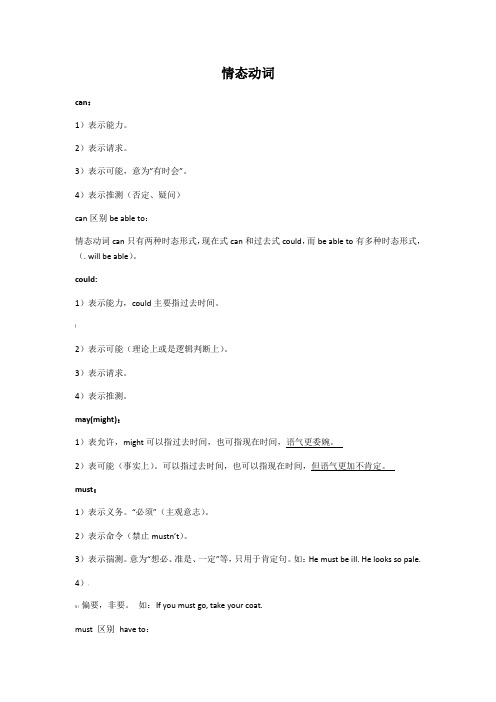
情态动词can:1)表示能力。
2)表示请求。
3)表示可能,意为”有时会”。
4)表示推测(否定、疑问)can区别be able to:情态动词can只有两种时态形式,现在式can和过去式could,而be able to有多种时态形式,(. will be able)。
could:1)表示能力,could主要指过去时间。
(2)表示可能(理论上或是逻辑判断上)。
3)表示请求。
4)表示推测。
may(might):1)表允许,might可以指过去时间,也可指现在时间,语气更委婉。
2)表可能(事实上)。
可以指过去时间,也可以指现在时间,但语气更加不肯定。
must:1)表示义务。
“必须”(主观意志)。
2)表示命令(禁止mustn’t)。
3)表示揣测。
意为“想必、准是、一定”等,只用于肯定句。
如:He must be ill. He looks so pale.4)-5)偏要,非要。
如:If you must go, take your coat.must 区别have to:表示说话人的主观思想,have to 表示客观需要。
用来指一现在时和一般将来时, 过去式可用have to 的过去式代替。
*must的否定回答为:—Must we hand in our exercise-books now 我们现在就要交练习本吗—No, you needn′t./No, you don′t have to.不必。
(这种情况下,一般不用mustn′t)need情态动词—Need/Must I go.—No, you needn′t./No, you don′t have to.(—Yes, you must.)实义动词.need to do sth/need doing sthdare 除用作情态动词外,更多的是当实义动词使用, 用法同实义动词一样,要考虑人称,单复数,时态等。
dare to do sth/daren’t do sthwill1)表意愿。
- 1、下载文档前请自行甄别文档内容的完整性,平台不提供额外的编辑、内容补充、找答案等附加服务。
- 2、"仅部分预览"的文档,不可在线预览部分如存在完整性等问题,可反馈申请退款(可完整预览的文档不适用该条件!)。
- 3、如文档侵犯您的权益,请联系客服反馈,我们会尽快为您处理(人工客服工作时间:9:00-18:30)。
情态动词
can:
1)表示能力。
2)表示请求。
3)表示可能,意为”有时会”。
4)表示推测(否定、疑问)
can区别be able to:
情态动词can只有两种时态形式,现在式can和过去式could,而be able to有多种时态形式,(e.g. will be able)。
could:
1)表示能力,could主要指过去时间。
2)表示可能(理论上或是逻辑判断上)。
3)表示请求。
4)表示推测。
may(might):
1)表允许,might可以指过去时间,也可指现在时间,语气更委婉。
2)表可能(事实上)。
可以指过去时间,也可以指现在时间,但语气更加不肯定。
must:
1)表示义务。
“必须”(主观意志)。
2)表示命令(禁止mustn’t)。
3)表示揣测。
意为“想必、准是、一定”等,只用于肯定句。
如:He must be ill. He looks so pale. 4)偏要,非要。
如:If you must go, take your coat.
must 区别have to:
1.must 表示说话人的主观思想,have to 表示客观需要。
2.must 用来指一现在时和一般将来时, 过去式可用have to 的过去式代替。
*must的否定回答为:
—Must we hand in our exercise-books now? 我们现在就要交练习本吗?
—No, you needn′t./No, you don′t have to.不必。
(这种情况下,一般不用mustn′t)
need
情态动词
—Need/Must I go?
—No, you needn′t./No, you don′t have to.(—Yes, you must.)
实义动词.
need to do sth/need doing sth
dare 除用作情态动词外,更多的是当实义动词使用, 用法同实义动词一样,要考虑人称,单复数,时态等。
dare to do sth/daren’t do sth
will
1)表意愿。
2)表提出请求、建议或看法。
3)表功能,意为”能行”。
如:This will do if there is nothing better.
4)表示某种倾向或习惯性动作。
如:The boy will sit there hour after hour looking at the traffic go by.
would:
1)表意愿。
2)表委婉地提出请求、建议或看法。
3)表推测,”大概”
4)表过去反复发生的动作或过去的一种倾向。
used to:
表示过去的习惯动作或状态,现在不复发生或存在。
如:People used to think that the earth was flat. 过去人们认为地球是平的。
(现在人们不这么认为。
)
shall:
1)表征询意见,用于第一、第三人称疑问句。
如:Shall I get you some tea?
Shall the boy wait outside?
What shall we do this evening?
2)命令、允诺、警告(用于第二、第三人称陈述句)如:You shall do as I say. He shall be sorry for it one day, I tell you.
3)根据规则,规定。
(用于第三人称陈述句)”应该,必须”如:No one shall take the book without permission according to the rule.
should:
1)表征求意见。
意为”应该”。
2)表义务。
意为“应该” 。
3)表推测,意为“想必一定、照说应该、估计”等。
如: They should be home by now. 照说他们现在应当已经到家了。
4)表吃惊,意为“竟然”。
ought to:
1)表义务,意为“应该”(因责任、义务等该做),口气比should稍重。
2)表推测。
如:Han Mei ought to know his telephone number. 韩梅该知道他的电话号码。
情态动词的推测:
must-一定
should/ought to-按理说,照理应该
may/can 可能(主观)/有时会(客观)
may/might 可能。
